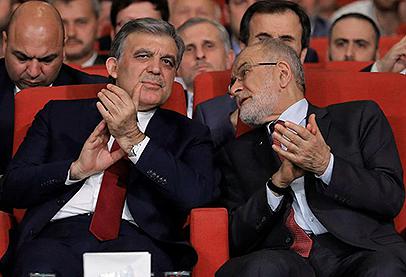After long history of defeats, Turkish opposition sees a chance to beat Erdogan
Sunday 29/04/2018

After more than a decade of being defeated by Turkish leader Recep Tayyip Erdogan and his party at the polls, Turkey’s opposition sees a strong chance to beat the president in early elections in June.
Buoyed by opinion polls that indicate Erdogan would struggle to reach more than 50% of the vote June 24 and win the presidential election in the first round, opposition parties have thrown themselves into a flurry of talks about possible alliances.
In political constellations unusual for Turkey, the talks brought together secularists, Islamists and nationalists bent on preventing Erdogan from winning a new 5-year term with vastly expanded executive powers. If no candidate gets more than 50% of the vote in the first round, the two highest finishing contenders would face a July 8 run-off.
Preparations for the elections included extraordinary political manoeuvres. In a move that enraged Erdogan’s Justice and Development Party (AKP), the secularist Republican People’s Party (CHP) had 15 of its lawmakers in parliament join the nationalist Iyi (Good) Party to give the newly formed Iyi enough deputies to take part in the election. The AKP, in power since 2002, could lose its majority in parliamentary elections, also scheduled for June 24, some polls indicate.
“There is a sense of hope and optimism within the opposition that is new,” Washington-based Turkey analyst Selim Sazak said in an interview. “People feel like they might finally have a viable pathway to defeating Erdogan.”
Erdogan called the elections 17 months early to capitalise on strong public support for Turkey’s military intervention in Syria, to avoid a crash of the economy, which is showing signs of overheating, before Election Day and to catch the opposition by surprise.
Victory for Erdogan in the presidential election would complete a switch from a parliamentary to a presidential system in Turkey, which would give the 64-year-old the power to rule by decree, draw up the budget and appoint judges, while parliamentary rights would be limited. Critics say that system would cement authoritarianism in Turkey.
Since Erdogan announced the early election on April 18, Turkish politics has been consumed by the question of who will be his challengers in the presidential poll. Former President Abdullah Gul, 67, an ex-Erdogan ally, had been among the front-runners expected to challenge the incumbent but ruled himself out April 28.
Gul said “it became clear there was no consensus” around his candidacy. “For this reason, I will not run as a presidential candidate,” he said.
Some members of the Turkish opposition, especially on the left, had been critical of Gul’s support for many of Erdogan’s policies that had moved the country towards authoritarianism.
Howard Eissenstat, associate professor at St Lawrence University in New York and non-resident senior fellow at the Project on Middle East Democracy in Washington, said the backlash against Gul showed that a candidacy by the former president could actually be bad for the opposition.
“I don’t think he would necessarily be a good choice,” Eissenstat said about Gul in an e-mail message. “The calculation is that he would pull away some AKP votes while the opposition would vote for him out of obligation but the more likely scenario is that many in the opposition — who detest Gul as an enabler of Erdogan — would simply stay home.”
In Gul’s absence, other Erdogan challengers have come forward. Iyi leader Meral Aksener has said she is running.
Selahattin Demirtas, former leader of the pro-Kurdish People’s Democratic Party who scored about 10% of the vote in the presidential election in 2014, is also running. As Demirtas has been in pretrial detention for alleged support for a Kurdish terrorist group since November 2016, his candidacy is largely symbolic.
While the opposition is looking for the best way to end the Erdogan era, the president is showing signs of nervousness. He angrily left his presidential suite in parliament during the speech of an opposition deputy and said the transfer of CHP deputies to Iyi had “polluted” parliament.
Sazak said Erdogan was keenly aware that any development that makes him look weak could shatter the unity of the AKP, which would be dangerous for his own position at the top.
Reports said Erdogan, who had declared for months that the elections would take place at the regular date in November 2019, made the decision for early elections after being prodded by his nationalist partner Devlet Bahceli, who leads the Nationalist Movement Party. Other reports say a group of up to 50 AKP lawmakers is preparing to join Saadet.
“Erdogan has reasons to worry about the AKP’s stability,” Sazak said. “If he looks vulnerable, many of those in the party but not in his personal circle will run for the exits.”
Thomas Seibert is an Arab Weekly contributor in Istanbul.
This article was originally published in The Arab Weekly.

